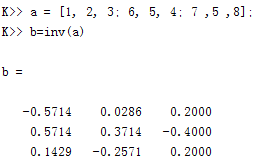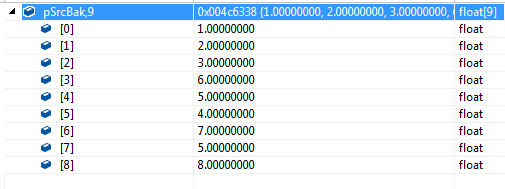转载请注明出处:
http://www.cnblogs.com/darkknightzh/p/5578027.html
参考文档:mkl的说明文档
lapack_int LAPACKE_sgesv(int matrix_layout, lapack_int n, lapack_int nrhs, float * a, lapack_int lda, lapack_int * ipiv, float * b, lapack_int ldb);
该函数计算AX=B的解。简单来说,当B为单位矩阵时,X即为inv(A)。
输入:
matrix_layout:矩阵存储顺序,C++中为行优先LAPACK_ROW_MAJOR
n:线性方程的个数,$nge 0$
nrhs:矩阵B的列数,$nrhsge 0$
a:大小max(1, lda*n),包含n*n的系数矩阵A
b:列优先存储时,大小max(1, ldb* nrhs);行优先存储时,大小max(1, ldb*n);包含n* nrhs的矩阵B
lda:矩阵a的leading dimension,$ldage max (1,n)$
ldb:矩阵b的leading dimension;列优先存储时,$ldbge max (1,n)$;行优先存储时,$ldbge max (1,nrhs)$
输出:
a:(具体看说明文档)可能会被覆盖
b:(具体看说明文档)调用此函数时被覆盖
ippv:(具体看说明文档)大小最小是max(1, n)
返回值:0成功,其他不成功
This function returns a value info.
If info=0, the execution is successful.
If info = -i, parameter i had an illegal value.
If info = i, ${{U}_{i,i}}$ (computed in double precision for mixed precision subroutines) is exactly zero. The factorization has been completed, but the factor U is exactly singular, so the solution could not be computed.
程序:
1 int SCalcInverseMatrix(float* pDst, const float* pSrc, int dim) 2 { 3 int nRetVal = 0; 4 if (pSrc == pDst) 5 { 6 return -1; 7 } 8 9 int* ipiv = new int[dim * dim]; 10 float* pSrcBak = new float[dim * dim]; // LAPACKE_sgesv会覆盖A矩阵,因而将pSrc备份 11 memcpy(pSrcBak, pSrc, sizeof(float)* dim * dim); 12 13 memset(pDst, 0, sizeof(float)* dim * dim); 14 for (int i = 0; i < dim; ++i) 15 { 16 // LAPACKE_sgesv函数计算AX=B,当B为单位矩阵时,X为inv(A) 17 pDst[i*(dim + 1)] = 1.0f; 18 } 19 20 // 调用LAPACKE_sgesv后,会将inv(A)覆盖到X(即pDst)中 21 nRetVal = LAPACKE_sgesv(LAPACK_ROW_MAJOR, dim, dim, pSrcBak, dim, ipiv, pDst, dim); 22 23 delete[] ipiv; 24 ipiv = nullptr; 25 26 delete[] pSrcBak; 27 pSrcBak = nullptr; 28 29 return nRetVal; 30 }
调用:
1 const int nDim = 3; 2 float pa[nDim * nDim] = { 1, 2, 3, 6, 5, 4, 7 ,5 ,8 }; 3 float pb[nDim * nDim]; 4 5 int nRetVal = SCalcInverseMatrix(pb, pa, nDim);
结果:

matlab调用inv后的结果:

可见在精度允许的范围内,结果一致。
另一方面,在调用LAPACKE_sgesv之前:

调用LAPACKE_sgesv之后:

可见,存储A的缓冲区被覆盖。